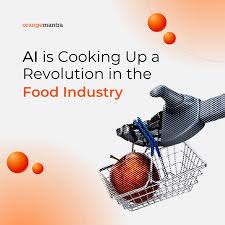Mohammad Rasim Omer
A recipe for innovation How artificial intelligence is enhancing efficiency, personalization and sustainability in food businesses Applications of AI in the food industry: Changing the future of food Pakistan’s food industry drives the country’s economy plays an important role in the above. It provides employment to millions of people and contributes significantly to GDP. However, it is not without its challenges. Issues such as food waste, inconsistent quality, inefficient supply chains, and poor food safety practices are prevalent. From your favorite fast food brands like KFC to your local naanwala, the problem grows by the day. AI proposes innovative solutions to these problems that have the potential to revolutionize the food industry. For all you food lovers like me, get ready because AI is going to take us there. AI’s place in the food sector AI has already had a major impact in sectors such as transportation, healthcare, and retail, and its potential applications to the food industry are clear. You can support your food business in a variety of ways, including: ● Efficiency and cost savings: Imagine a system that allows restaurants to accurately predict how much inventory they need to avoid stockouts and waste. That’s the role of AI. By looking for patterns, you can reduce human error, simplify inventory management, relieve some of your employees’ workload, and increase productivity. ● Personalized dining experience: Have you ever imagined a restaurant reading your thoughts and serving you the exact meal you want? AI makes it possible. By researching past consumer behavior, we offer customized menu suggestions and promotions, ensuring happier and more devoted customers. ● Improved food safety: Using AI, companies can monitor food quality in real-time and spot contamination and quality issues before they become problems. This ensures consistent standards and compliance with international regulations. ●Sustainability: AI has the potential to reduce the huge amount of waste generated by restaurants. By monitoring waste trends and energy consumption, we encourage environmentally friendly behavior, reduce carbon emissions, and contribute to climate change mitigation. Applications of AI in the food industry AI holds great potential for Pakistan and is already revolutionizing food business globally. Important uses include: ● Personalization: To provide customers with a personalized experience, famous brands like Domino’s Pizza employ AI to suggest menu items based on their previous orders. Similarly, AI can help Pakistani eateries accommodate dietary requirements such as vegan and gluten-free menus. ● Demand Forecasting: AI uses historical sales data, weather data, and local events to predict consumer demand. This allows restaurants to maintain the right amount of inventory so they don’t waste or run out of ingredients. ● Supply chain optimization: Whether tracking shipments or optimizing delivery routes, AI helps ensure fresh food reaches customers on time and reduces spoilage and delays. ● Customer engagement: AI-powered chatbots can handle customer queries, recommend dishes, and send personalized offers faster and more accurately than most human staff. ● Waste management: Tools like Winnow can help businesses save money and reduce surplus by analyzing food waste and suggesting portion adjustments. For a country like Pakistan, where food waste is rampant, this could make a big difference. Challenges and Future Directions Clearly, great things take time. High implementation costs make it difficult for small and medium-sized businesses to implement, and data privacy concerns are growing as more customer information is collected. Traditional setups often resist such changes, deeming AI too complex or unnecessary. But the future is bright. Imagine robot kitchens making meals, AI predicting food trends, and businesses implementing smarter sustainability solutions. For Pakistan’s food sector, implementing AI could mean reducing inefficiency and waste, and strengthening connections with customers. The sooner companies invest in AI, the sooner they can gain a competitive edge. AI is more than just a tool; it’s a gateway to transformation. This holds the key to making food businesses smarter, greener and more customer-focused. The question is whether we accept it or not.
- AI Ethics
- AI Legislation
- Business
- Cybersecurity
- Media and Entertainment
- Content Creation
- Art Generation
- Research
- Tools
- Resources
Subscribe to Updates
Subscribe to our newsletter and stay updated with the latest news and exclusive offers.
Previous ArticleNvidia celebrates 2024 AI research milestones – text prompts 3D modeling, advanced motion reconstruction, and more
Next Article AI reseller that enhances business processes
Related Posts
Add A Comment



